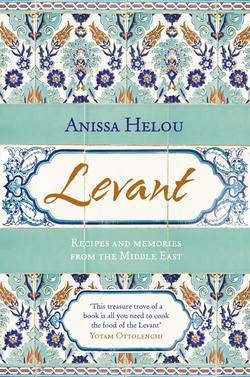Читать книгу Levant: Recipes and memories from the Middle East - Anissa Helou - Страница 7
Оглавление
I was a quiet and introverted child with an aversion to any activity that could lead to physical injury. I never rode a bicycle or climbed a tree or did any physical activity that most children did. Instead, I spent most of my time in the kitchen with my mother, grandmother or aunt, watching them cook or preserve our seasonal bounty (the preserved foodstuffs are called muneh in Arabic) for the winter months.
Spending time in my mother’s or grandmother’s kitchen in Beirut was exciting but it was nothing compared to being in my aunt’s kitchen in Mashta el-Helou, my father’s ancestral home in the Syrian mountains. ‘Ammto Zahiyeh (‘ammto means aunt in Arabic) made everything at home. There were no shops in Mashta in those days – just one tiny counter that my cousin had set up in his home where he had pens, paper and other necessities that couldn’t be made at home. He also kept the gigantic scales on which everyone weighed the grain and other produce grown on the family’s farms before storing or selling them.
My aunt lived in a lovely nineteenth-century stone house at the bottom of a rocky lane below the big family house. The latter looked like a caravanserail, with a series of beautiful vaulted rooms built around a large courtyard with a marble fountain in the middle. It was known as al-Dar (house in Arabic) and was older than my aunt’s house. Each brother or sister occupied one or more rooms depending on their share of the inheritance. My father had two rooms but we preferred to stay with my aunt who had married a cousin who built the house for her. We only went up to al-Dar to play with our cousins or for family gatherings.
I loved walking up and down the rocky lane and always felt a frisson as I entered or left the courtyard through a dark stone archway. It wasn’t the darkness that scared me but rather the room that lay abandoned to one side behind a large padlocked iron grill that was once the family prison. No one ever explained who had been locked in there, whether they were villainous members of the family or just outside aggressors, but the menace of their memory haunted me every time I walked through.
My aunt’s home was arranged slightly differently from the family compound. The courtyard was at the front of the house, with outbuildings to one side where she kept two milking cows and chickens. And just behind the house was her husband’s mausoleum, he had died quite young. The roof of the house was flat and we often went up there through the outside stone staircase, carrying fruit or vegetables to let them dry in the sun.
‘Ammto Zahiyeh was totally self-sufficient. Her farmers grew everything for her and she prepared all her staples. Her cows provided all the milk she needed, both to drink and to make butter, yoghurt and cheese. I can still see her and my mother, each sitting on a low stool on either side of a canvas cushion where they had placed a lovely earthenware jar in which they made the butter. They took it in turns shaking the jar, back and forth, again and again, until my aunt made a sign to stop. She just knew when the time had come for her to plunge her hand into the jar to bring out the dripping mass of butter. As soon as she did this, I would jump from my chair to ask her for some to eat with her home-baked bread and some of her fabulous fig jam.
My aunt also dried vegetables but these took more preparation. Aubergines had to be cored, green beans topped and tailed, and okra peeled at the stalk end to produce a smooth pointed end. Every year, she would unfailingly explain how important it was not to puncture the okra so as not to let the mucilaginous substance seep out during cooking. She and my mother threaded the vegetable onto cotton string, which they hung between trees in the courtyard. When the vegetables were dry, they tied the strings into long necklaces, and hung them in the qabu (meaning cave in Arabic but really describing the dark room where my aunt kept her muneh
